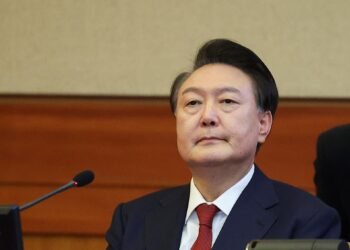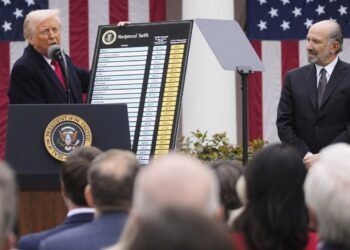CHENGDU, China (news agencies) — For a few days in October 2023, the capital of the science fiction world was Chengdu, China. Fans traveled from around the world as Worldcon, sci-fi ’s biggest annual event, was held in the country for the first time.
It was a rare moment when Chinese and international fans could get together to celebrate the arts without worrying about the increasingly fraught politics of China’s relationship with the West or Beijing’s tightening grip on expression.
For Chinese fans like Tao Bolin, an influencer who flew from the southern province of Guangdong for the event, it felt like the world finally wanted to read Chinese literature. Fans and authors mingled in a brand new Science Fiction Museum, designed by the prestigious Zaha Hadid Architects in the shape of a huge steel starburst over a lake.
But three months later, much of that goodwill turned sour as a scandal erupted over allegations that organizers of the Hugo Awards — sci-fi’s biggest prize, awarded at Worldcon — disqualified candidates to placate Chinese censors.
The event embodied the contradictions that Chinese science fiction has faced for decades. In 40 years, it’s gone from a politically suspect niche to one of China’s most successful cultural exports, with author Liu Cixin gaining an international following that includes fans like Barack Obama and Mark Zuckerberg. But it’s had to overcome obstacles created by geopolitics for just as long.
With a big-budget Netflix adaptation of his “The Three-Body Problem” set to drop in March, produced by the same showrunners as “Game of Thrones,” Chinese sci-fi could reach its biggest audience yet.
Getting there took decades of work by dedicated authors, editors and cultural bureaucrats who believed that science fiction could bring people together.
“Sci-fi has always been a bridge between different cultures and countries,” says Yao Haijun, the editor-in-chief of Science Fiction World, China’s oldest sci-fi magazine. “Every author can have their own vision of the future, and they can coexist and be respected even if they clash.”
Chinese sci-fi’s journey abroad started with another convention in Chengdu three decades ago, but politics nearly derailed that one before it could get off the ground.
Science Fiction World planned to host a writers’ conference in the city, known for its panda sanctuary and countercultural bend, in 1991. But as news of the brutal crackdown on student protesters in Beijing’s Tiananmen Square circled the globe in 1989, foreign speakers were dropping out.
The magazine sent a small delegation to Worldcon 1990, hosted in The Hague, to save the conference.
Its leader was Shen Zaiwang, an English translator in Sichuan province’s Foreign Affairs Department who fell in love with sci-fi as a child after reading Jules Verne books like “Twenty Thousand Leagues Under the Sea.” He packed instant noodles for the weekslong train journey across China and the fragmenting Soviet Union.
In The Hague, Shen and former magazine editor Yang Xiao used toy pandas and postcards of Chengdu to make the case that the city — more than 1,800 kilometers (1,000 miles) from Beijing — was friendly and safe to visit.
“We tried to introduce our province as a safe place, and that the people in Sichuan really hope the foreign science fiction writers can come and have a look and encourage Chinese young people to read more science fiction novels,” Shen says.
In the end, a dozen foreign authors attended the conference. It was a small start, but it was more than anyone could have imagined a few years earlier.
Chinese sci-fi had faced decades of suspicion at home.
The genre flourished in China in the first half of the 20th century, fueled by an interest in new technology and translated stories from abroad. But it disappeared during the Cultural Revolution, a tumultuous decade beginning in 1966 when Maoist radicals targeted “bourgeois” elements including both scientists and many types of literature.
Sci-fi saw a resurgence as China began opening to the world after the Mao era in the late 1970s and early 1980s. Authors like Zheng Wenguang and Ye Yonglie wrote stories about traveling into space, while China’s nascent space program launched its first satellites into orbit. Regional magazines such as Chengdu’s Science Fiction World mushroomed.
But in the early 1980s, Beijing initiated a nationwide “spiritual pollution cleaning” campaign to quash the influence of the decadent West, and sci-fi was accused of being unscientific and out of line with official ideology. Most of the young publications were shuttered.
Down in Chengdu, Science Fiction World’s editors kept going.









 United Arab Emirates Dirham Exchange Rate
United Arab Emirates Dirham Exchange Rate

